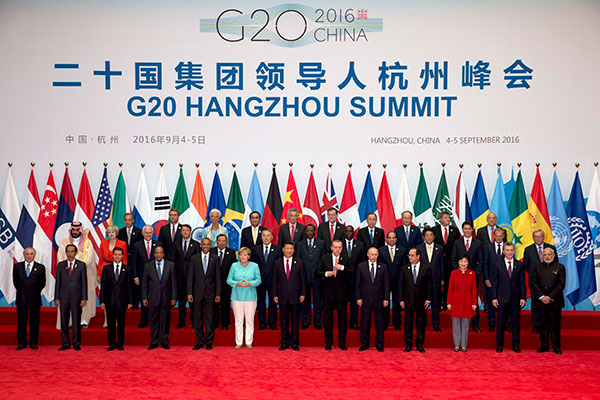Global cooperation can make a difference
- By Yi Fan
 0 Comment(s)
0 Comment(s) Print
Print E-mail China Daily, September 5, 2016
E-mail China Daily, September 5, 2016
|
|
|
Leaders pose for pictures during the G20 Leaders Summit at the Hangzhou International Expo Center in Hangzhou, East China's Zhejiang province, on Sunday. WU ZHIYI/CHINA DAILY |
Globalization was hailed as being the path toward greater shared prosperity. Things, however, started to change at the turn of this century, and the trend of anti-globalization has been gaining momentum.
There has been a growing wave of anti-globalization, anti-elitism, anti-establishment and the reemergence of populist politics in many countries. Brexit was a blunt rejection of Europe by those in Britain who complained about the influx of foreigners and the lack of jobs. A similar story can be seen across the Atlantic with the rise of US Republican presidential candidate Donald Trump, who has clearly won the support of those who complain about job losses, the influx of foreigners and the country's waning competitiveness.
And most of the world's major economies, notably advanced ones, are resorting to protectionist measures as the global economic slowdown bites harder. The WTO Doha round of negotiations has long been at an impasse. Both presidential candidates in the United States are promising what would be tantamount to a US exit from the global trading system.
There are a number of underlying causes for the anti-globalization movement: insufficient macroeconomic policy coordination among countries has left the existing international economic and financial governance system inefficient and ineffective; the sluggish global economic recovery and slow growth are undermining the case for open markets that globalization rests on; social endeavors, including poverty reduction, and better human rights and labor standards, lag behind across the world. Moreover, the benefits of globalization remain highly concentrated in a few countries and among the upper echelon of society.
At the same time, terrorism and political instability are slowing down the globalization process. The sense of insecurity that terrorism provokes and the fear that liberal standards are facilitating terrorism and that porous borders are allowing terrorists to enter target countries have caused the US and the members of the European Union to seek greater control over cross-border movements. And the spillovers of increasing geopolitical instability have added to people's sense of insecurity and prompted them to look inward.
However, the bottom line is, like it or not, we all live in a globalized world. Against such a backdrop, all eyes are now on the G20 Hangzhou Summit to deliver some answers.
China has set an ambitious agenda for the G20 Summit, which has the theme of "Toward an Innovative, Invigorated, Interconnected and Inclusive World Economy".
The summit is focusing on some of the most salient, critical and pressing issues facing the world economy, and exploring new ways to enhance policy coordination, innovate the growth model and promote more efficient global economic and financial governance.
The summit is set to promote more effective global economic and financial governance, as, based on the implementation of the 2010 quota and governance reform of the International Monetary Fund, the G20 members are working on the next round of quota reform with the aim of realizing it before the annual meeting of the IMF in 2017.
The summit is also set to revitalize support for trade and investment liberalization and facilitation. It will call for meaningful progress in the Doha round of WTO negotiations and commitments to roll back on protectionist measures, in order to take full advantage of trade and investment as two effective engines for world economic growth.
China will offer its experiences, wisdom and solutions to achieve strong, balanced, sustainable and inclusive growth. And the G20 Action Plan on the United Nation's 2030 Agenda for Sustainable Development and the G20 Initiative on Supporting Industrialization in Africa and Least Developed Countries will be issued, demonstrating a firm commitment to ensuring that developing countries are not left behind in future development.
The summit is also set to embrace the vision of a global community with a shared destiny, enhance economic connectivity and exchanges among countries so as to address inequality and imbalance in global development, and ensure that the benefits of global development are more equitably shared by people of all countries.
As the G20 Summit with the largest participation of the developing world, the Hangzhou Summit is anticipated to show to the world that global cooperation can make a difference and that countries can work together to build a community of shared interests, shared responsibilities and shared prosperity. And that is what it is expected to deliver.
The author is a Beijing-based observer of international studies.







Go to Forum >>0 Comment(s)